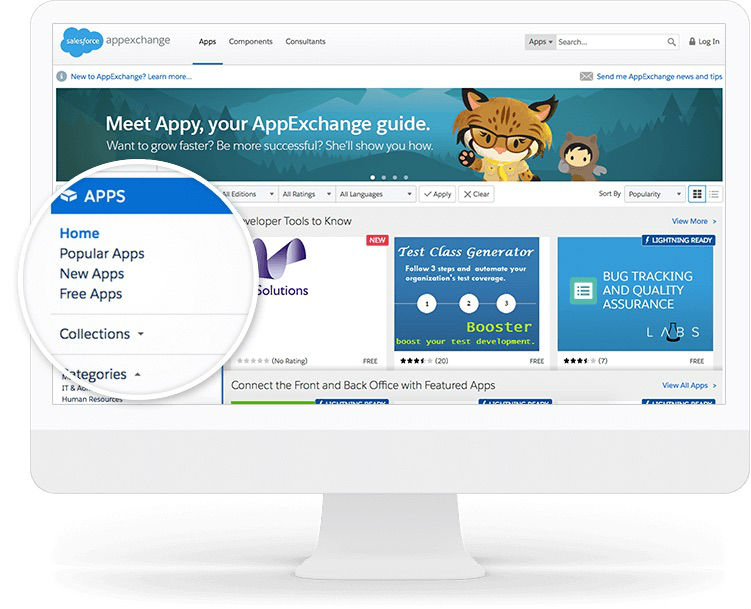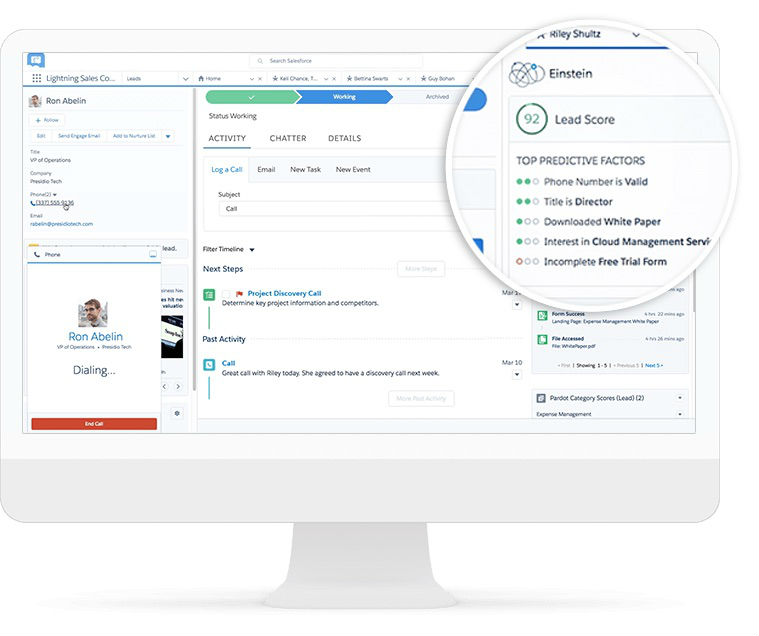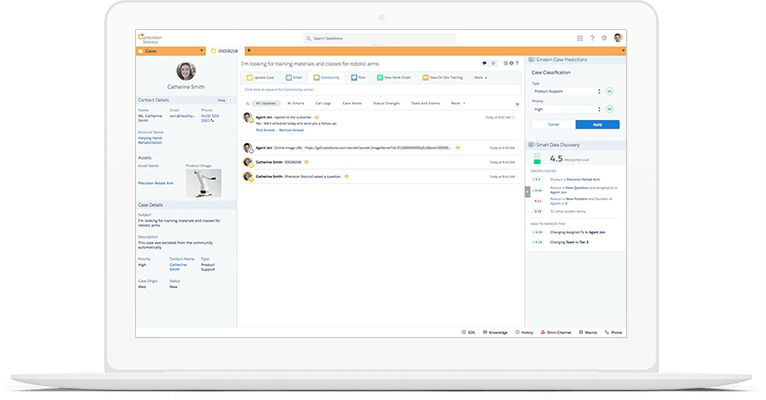
Get your FREE 30-day trial.
Start by selecting a product:
CRM – three letters that are becoming increasingly important to business success. But, if you’re unsure how CRM works, how it can benefit your business or how to choose the right CRM solution for your organisation, you’re at the right place. This post is part one of a six-part series covering the basics of CRM. Get ready to learn everything you need to know about getting started with CRM.
CRM stands for customer relationship management (CRM) and its technology that stores customer contact information like names, addresses and phone numbers, as well as keeps track of customer activity like website visits, phone calls, email, etc.
The advantage is simple. By having all of this information in one place, you can better manage your company’s relationships and interactions with customers, prospects and stakeholders. A CRM also helps you streamline processes, improve productivity and boost profitability. Here’s a few of our customers explaining what CRM means to them:
From sales and service teams to business development, HR and marketing, a CRM system gives everyone within a company a better way to manage the interactions and relationships that drive business success. This could be with customers, prospects, employees, colleagues or suppliers.
By storing customer and prospect contact information in a CRM system, you can identify sales opportunities, record service issues and manage marketing campaigns, all in one central location. Plus, customer data can be made available to anyone who might need it – regardless of the team they’re in or their location.
Using a simple, customisable dashboard, anyone in your company can see a customer’s previous history with you, including the status of their orders, what marketing they’ve received, any outstanding customer service issues and much more. This also means it's easier to collaborate across departments, increasing productivity.
Typically, marketers use a CRM solution to better understand the pipeline of sales and prospects coming in, making forecasting simpler and more accurate. With full visibility of every opportunity or lead, you can see a clear path from enquiries to sales.
Meanwhile a CRM platform lets customer service teams manage enquiries across multiple service channels without losing track of the conversation – all while giving sales and marketing a complete view of the customer interaction.
CRM is helping companies of all sizes drive business growth. But, the technology can be particularly beneficial to a small business, where teams often need to find ways to do more with less. To find out more about how small businesses use CRM, check out the video below.
Running a business without CRM can cost you money. CRM simplifies repetitive administration tasks, so you can concentrate on things that drive business value.
A sales team, for example, can generate a flood of data. Reps are out on the road talking to customers, meeting prospects and finding out valuable information. But all too often, this information gets stored in handwritten notes, individual laptops or inside the heads of your salespeople.
Details can get lost, meetings not followed up on and the prioritisation of customers can be a matter of guesswork, rather than a rigorous exercise based on fact. And, it can be compounded if a key salesperson moves on.
But, it's not just employees that suffer without CRM; it’s also your customers. Without a central source of truth for customer interactions, communications can be missed, lost or doubled up on in the flood of information.
Even if you do successfully collect all this data, you’re faced with the challenge of making sense of it. It can be difficult to extract intelligence when business data is held in multiple locations. Reports can be hard to create and time-consuming. Managers can also easily lose sight of what their teams are up to, which means not being able to offer the right support at the right time.
CRM systems start by collecting basic information about a customer – their website address, email address, phone number, social media data, etc. This is collected across multiple sources and channels. It may also automatically pull in other information, such as recent news about the company's activity. It can also store personal details, such as a client's personal preferences on communications.
The CRM tool then organises this information to give you a complete record of individuals and companies, and helps you better understand the relationship over time.
You can also connect a CRM platform to other business apps that aid the customer experience. The CRM solutions of today are more open, allowing you to easily integrate your favourite business tools, such as document signing, accounting, billing and surveys, so that information flows both ways, giving you a 360-degree view of the customer.

But, the new generation of CRM goes one step further. Built-in intelligence automates administrative tasks, like data entry, and lead or service case routing, which frees up time for you to spend on more valuable activities. It also automatically generates insights to help you understand your customers better. It even predicts how they will feel and act so you can prepare the right outreach.

1. Improves your bottom line
It has been proven that businesses that introduce a CRM platform enjoy benefits such as a direct improvement on their bottom lines. CRM applications have a proven track record of increasing:
Lead conversion by up to 30%
Sales by up to 30%
Sales productivity by up to 35%
Customer satisfaction by up to 35%
Faster decision-making by up to 38%
Revenue by up to 25%.
Average percentage improvements reported by Salesforce customers
Source: Salesforce Relationship Survey conducted 2014–2016 among 10,500+ customers randomly selected. Response sizes per question vary.
2. Helps identify and categorise leads
A CRM system helps you identify and add new leads easily and quickly, and categorise them accurately. By focusing on the right leads, sales can prioritise the opportunities that will close deals and marketing can identify leads that need more nurturing and prime them to become quality leads.
With complete, accurate and centrally-held information about clients and prospects, sales and marketing can then focus their attention and energy on onboarding the right clients.
3. Increases cross-selling and upselling opportunities
By understanding your customers better, cross-selling and upselling opportunities become more obvious, giving you the chance to win new business from existing customers.
With improved visibility, you’ll also be able to keep your customers happy with better service. And, happy customers are more likely to become repeat customers, and repeat customers are expected to spend more — up to 33%, according to some studies.
4. Enables better customer service
A CRM system can help you provide the fast, personalised, 24/7 support that customers of today expect. Your agents can quickly access a record of every customer interaction and purchase, so they can give customers the answers they need, fast.

5. Insights to improve products and services
A good CRM system will gather information from a wide variety of sources across your business and beyond. This gives you unprecedented insights into how your customers feel and what they are saying about your business, helping you improve your products and services, spot problems early and identify gaps.
Perhaps the most significant recent development in CRM systems has been the move to cloud computing and away from on-premise CRM software.
No longer having to install software on hundreds or thousands of desktop computers and mobile devices, organisations worldwide are discovering the benefits of moving data, software and services into a secure online environment.
A cloud-based CRM platform offers you:
Faster deployment
Automatic software updates
Cost-effectiveness and scalability
The ability to work from anywhere, on any device
Increased collaboration.
Learn more about the business benefits of using CRM. Keep reading ‘CRM 101: Part 2 – 6 ways CRM can help your business grow’ or find out what makes Salesforce the world’s number one CRM.